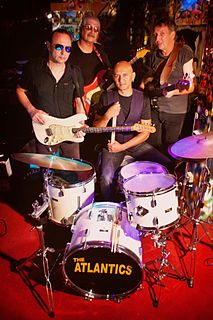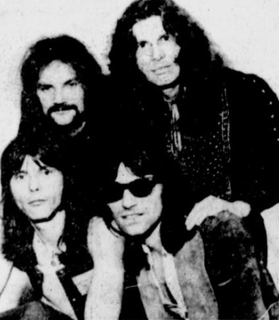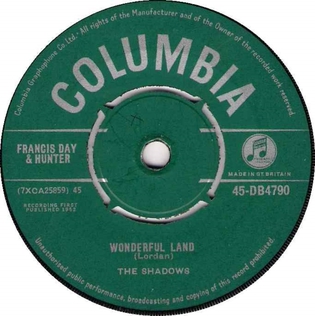Related Research Articles

Manfred Mann were an English rock band, formed in London and active between 1962 and 1969. The group were named after their keyboardist Manfred Mann, who later led the successful 1970s group Manfred Mann's Earth Band. The band had two different lead vocalists, Paul Jones from 1962 to 1966 and Mike d'Abo from 1966 to 1969.

The Atlantics are an Australian surf rock band founded in 1961. Initially, the band line-up consisted of drummer Peter Hood, bassist Bosco Bosanac, Theo Penglis on lead and rhythm guitar, and guitarist Eddy Matzenik. Matzenik was replaced by Jim Skaithitis while the band was still in its earliest stages, long before the band recorded or released albums. The band's claim to fame was as Australia's most successful of the genre. Most well known for their classic hit, "Bombora", their later recordings such as "Come On" are examples of 1960s garage rock. They were the first Australian rock band to write their own hits. In 2000 the group reformed with three of the original members, and continue to release new material and perform in concert. In 2013 the group celebrated the 50th Anniversary of their first album, Bombora and the eponymous single that was their first to chart. A European tour was organised to mark the occasion.

Ten Years After are a British blues rock band, most popular in the late 1960s and early 1970s. Between 1968 and 1973, Ten Years After scored eight Top 40 albums on the UK Albums Chart. In addition, they had twelve albums enter the US Billboard 200.

The Champs are an American rock band, most famous for their Latin-tinged rock and roll instrumental "Tequila". The group took their name from that of Gene Autry's horse, Champion, and was formed by studio executives at Autry's Challenge Records to record a B-side for the Dave Burgess single, "Train to Nowhere". The intended throwaway track became more famous than its A-side, as "Tequila" went to No. 1 in just three weeks, and the band became the first group to go to the top spot with an instrumental that was their first release. The song was recorded at Gold Star Studios in fall 1957, and in 1959 won the Grammy Award for Best R&B Performance. It sold over one million copies, and was awarded a gold disc by the RIAA.

Hamilton, Joe Frank & Reynolds were a 1970s soft rock trio from Los Angeles. The original members were Dan Hamilton, Joe Frank Carollo (bass/vocal), and Tommy Reynolds (multi-instrumentalist/vocal), all of whom had previously played in The T-Bones, a 1960s band noted for the instrumental hit "No Matter What Shape ."
Unit 4 + 2 were a British pop band, who had a number one hit on the UK Singles Chart in 1965 with the song "Concrete and Clay". The track topped the UK chart for one week.

Dominick P. "Don" Costa was an American conductor and record producer. He discovered singer Paul Anka and worked on several hit albums by Frank Sinatra, including Sinatra and Strings and My Way.

Argent were an English rock band founded in 1969 by keyboardist Rod Argent, formerly of the Zombies. They had three UK top 40 singles: "Hold Your Head Up", which reached number five and spent 12 weeks on the chart, "Tragedy", and "God Gave Rock and Roll to You". Two of their albums charted in the UK: All Together Now, which peaked at number 13 in 1972, and In Deep, which spent one week at number 49 in 1973.

The Shadows were an English instrumental rock group, who dominated the British popular music charts in the late 1950s and early 1960s, in the pre-Beatles era. They served as the backing band for Cliff Richard from 1958 to 1968, and have joined him for several reunion tours.
"Cherry Pink and Apple Blossom White" or "Cerezo Rosa" or "Ciliegi Rosa" or "Gummy Mambo", is the English version of "Cerisiers Roses et Pommiers Blancs", a popular song with music by Louiguy written in 1950. French lyrics to the song by Jacques Larue and English lyrics by Mack David both exist, and recordings of both have been quite popular. However, Pérez Prado's recording of the song as an instrumental with his orchestra featuring trumpeter Billy Regis, whose trumpet sound would slide down and up before the melody would resume, was the most popular version in 1955, reaching number one for 10 weeks on the Billboard chart. It became a gold record. Pérez had first recorded this title for the movie Underwater! (1955), where Jane Russell can be seen dancing to the song. Prado recorded Cherry Pink several times, the best known version being the original hit recording from 1955 and the 1960 recording in stereo. Billboard ranked the former version as the No. 1 song of 1955. The most popular vocal version in the U.S. was by Alan Dale, reaching No. 14 on the chart in 1955.

"Riders on the Storm" is a song by American rock band the Doors. It was released in June 1971, as the second single from L.A. Woman, their sixth studio album and the last with lead singer Jim Morrison. The song reached number 14 on the U.S Billboard Hot 100, number 22 on the UK Singles Chart, and number seven in the Netherlands.
"(Ghost) Riders in the Sky: A Cowboy Legend" is a cowboy-styled country/western song written in 1948 by American songwriter, film and television actor Stan Jones.

"The Last Time" is a song by the English rock band the Rolling Stones, and the band's first original song released as an A-single in the UK. Written by Mick Jagger and Keith Richards, and recorded at RCA Studios in Hollywood, California in January 1965, "The Last Time" was the band's third UK single to reach number one on the UK Singles Chart, spending three weeks at the top in March and early April 1965. It reached number two in the Irish Singles Chart in March 1965, and was released on the US version of the album Out of Our Heads on 30 July 1965.

"It's Not Unusual" is a song written by Les Reed and Gordon Mills, first recorded by a then-unknown Tom Jones, after having first been offered to Sandie Shaw. He intended it as a demo for her, but when she heard it she was so impressed with his delivery that she recommended he sing it instead.

"Hide Away" or "Hideaway" is a blues guitar instrumental that has become "a standard for countless blues and rock musicians performing today". First recorded in 1960 by Freddie King, the song became a hit on the record charts. It has been interpreted and recorded by numerous blues and other musicians and has been recognized by the Rock and Roll Hall of Fame and the Grammy Hall of Fame.

"Wonderful Land" is an instrumental piece written by Jerry Lordan and first recorded and released as a single by The Shadows in February 1962. It stayed at number one for eight weeks on the UK Singles Chart, a feat only Elvis Presley, the Shadows and the Archies managed in the whole of the 1960s.
"Concrete and Clay" is a 1965 hit single recorded by the UK pop group Unit 4 + 2. It reached No. 1 on the UK Singles Chart in April 1965. The song was written by group members Tommy Moeller and Brian Parker. It was also a top 40 hit for Eddie Rambeau in 1965.

Have 'Twangy' Guitar Will Travel is the debut album by the guitarist Duane Eddy. It was released in 1958 on Jamie Records, as JLP-3000. There were five charting singles and a B-side of an additional charting single taken from this album.

"Apache" is a song written by Jerry Lordan and first recorded by Bert Weedon. Lordan played the song on ukulele to the Shadows while on tour, and liking the song, the group released their own version which topped the UK Singles Chart for five weeks in mid-1960. The Shadows' guitarist Hank Marvin developed the song's distinctive echo and vibrato sound. After hearing the Shadows' version, Danish guitarist Jørgen Ingmann released a cover of the song in November 1960 which peaked at number 2 on the Billboard Hot 100 in the US.
The Rockin’ Ramrods were an American garage rock band from Boston, Massachusetts, who were active in the 1960s and early 1970s. Along with the Barbarians, the Remains and the Lost, they were one of the most popular acts in the Boston area. While they did not achieve national success, their work is today well-regarded by garage rock collectors and enthusiasts. They are perhaps best remembered for the 1964 protopunk anthem "She Lied." Though best known as the Rockin’ Ramrods, they recorded under other names. They recorded one single as the GTO's. In 1968, Ronn Campisi left to form Puff who recorded one album, but the Rockin' Ramords subsequently reformed as the Ramrods, but with a different lineup, and released an album in 1971.
References
- 1 2 3 4 5 6 Colin Larkin, ed. (1992). The Guinness Encyclopedia of Popular Music (First ed.). Guinness Publishing. pp. 2039/40. ISBN 0-85112-939-0.
- 1 2 The Ramrods, Rockabilly.nl
- ↑ Whitburn, Joel (2003). Top Pop Singles 1955-2002 (1st ed.). Menomonee Falls, Wisconsin: Record Research Inc. p. 576. ISBN 0-89820-155-1.
- ↑ Betts, Graham (2004). Complete UK Hit Singles 1952-2004 (1st ed.). London: Collins. p. 630. ISBN 0-00-717931-6.